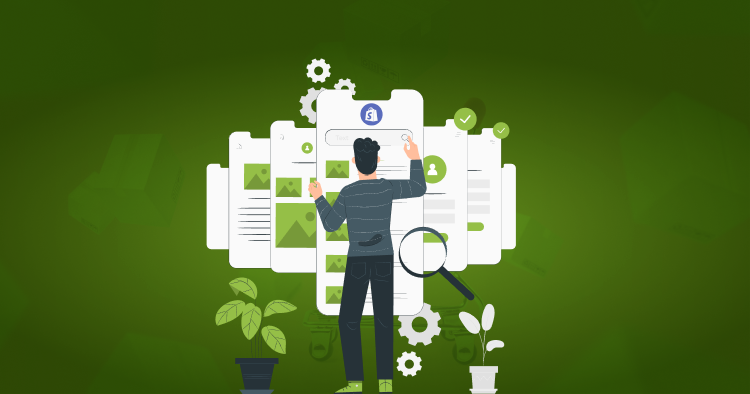Stuck with limited features on Ecwid? Your online store deserves better. When you migrate Ecwid to Shopify, you unlock advanced selling tools, better scalability, and a platform that grows with your business.
This guide walks you through the exact process to move your products, customers, and orders from Ecwid to Shopify. You’ll learn what to prepare, how to transfer data safely, and what to check after migration.
Summary
- Pre-Migration Steps: Back up your Ecwid store data and create your Shopify account
- Data Transfer Options: Choose between manual CSV import, automated migration tools, or professional services
- Step-by-Step Process: Follow six clear stages from setup to launch
- Domain Transfer: Learn how to move or connect your existing domain to Shopify
- Post-Migration Tasks: Test functionality, configure settings, and optimize your new store
- Cost Considerations: Understand migration service fees and Shopify subscription costs
Why Store Owners Migrate Ecwid to Shopify
Platform Scope and Capabilities
Ecwid functions as a plugin for adding e-commerce to existing websites. Shopify provides a complete platform built specifically for online retail. This fundamental difference matters when you need room to grow.
Shopify stores access over 8,000 apps for marketing, fulfillment, and customer service. The platform handles 4 million live stores worldwide compared to Ecwid’s 182,000. This larger ecosystem means better support and more integration options.
Superior Feature Set
The Shopify platform includes abandoned cart recovery as standard. You get real-time shipping rates from major carriers. Multi-channel selling across social media and marketplaces comes built-in.
Shopify’s payment processing accepts 100+ payment methods globally. Your customers enjoy faster checkout with Shop Pay. These features work together to increase conversion rates.
Better Performance and Reliability
Page load speed directly impacts sales. Shopify delivers average load times under 2 seconds with 99.98% uptime. The platform automatically handles traffic spikes during peak seasons.
This reliability matters when every minute of downtime costs revenue. Your store stays accessible while competitors struggle with performance issues.
Pre-Migration Checklist
Back Up Your Ecwid Data
Export your complete store database before making changes. Download CSV files for products, customers, orders, and gift cards from your Ecwid Control Panel. Store backups in multiple locations for security.
Audit Your Current Store
Review which products actively sell and identify outdated inventory. Check for broken links or missing product images. Document custom features and third-party integrations currently in use.
Set Up Your Shopify Store
Visit Shopify.com and start your free trial. Provide basic business information and complete your address details. Take time to explore Shopify’s interface before importing data.
Ecwid to Shopify Migration Methods Compared
| Method | Cost | Time Required | Technical Skill | Data Accuracy | Best For |
| Manual CSV Import | Free | 8-20 hours | Medium | Variable | Small stores (<100 products) |
| Migration Apps | $50-500 | 2-4 hours | Low | High | Medium stores (100-5000 products) |
| Professional Services | $500-5000+ | 1-2 weeks | None | Very High | Large stores or complex setups |
| Hybrid Approach | $100-1000 | 4-8 hours | Low-Medium | High | Stores needing custom work |
Step-by-Step: How to Migrate Ecwid to Shopify
Step 1: Prepare Source and Target Stores
Log in to your Ecwid admin panel and navigate to Settings > API to generate your Store ID and Secret Token. In Shopify, create an API app under Apps > Develop apps and save your API password.
Step 2: Choose Your Migration Tool
Export products from Ecwid as CSV and reformat for Shopify’s template, or use automated tools like LitExtension and Cart2Cart that connect both stores through API.
Step 3: Configure Migration Settings
Select entities to migrate (products, customers, orders, categories). Enable options like 301 redirects and maintaining order IDs to preserve SEO.
Step 4: Run Demo Migration
Test transfer with 10-20 sample products. Verify titles, pricing, images, and variants before proceeding with full migration.
Step 5: Execute Full Data Transfer
Start complete migration. Processing takes 30 minutes to 5 hours, depending on store size. Most tools run migrations in the cloud.
Step 6: Verify Migration Results
Check product counts, inventory quantities, customer emails, and order history matches. Test front-end display and checkout process functionality.
Domain Transfer Options
Transfer Ecwid Domain to Shopify
Access My Domains in Ecwid, select Advanced > Transfer away, and request your EPP code. In Shopify admin, go to Settings > Domains > Transfer domain and enter your EPP code. Transfers are complete in 7 days.
Connect Existing Domain to Shopify
Log in to your domain provider and access DNS settings. Add Shopify’s A record (23.227.38.65) and CNAME record (shops.myshopify.com). DNS changes propagate in 24-48 hours.
Essential Post-Migration Tasks
Configure Store Settings
Set up payment gateways through Settings > Payments. Configure shipping zones, rates, and fulfillment locations.
Customize Store Design
Browse Shopify’s theme store and select a design matching your brand. Upload your logo, adjust colors and typography, and configure menu navigation.
Install Essential Apps
Add core apps for email marketing, customer reviews, SEO, and analytics. Test each app individually before adding more to avoid performance issues.
Set Up 301 Redirects
Create redirects for product pages, collections, and blog posts through Online Store > Navigation > URL Redirects. This preserves SEO value and prevents broken links.
Data Migration Best Practices
| Practice | Why It Matters | Implementation |
| Test thoroughly | Prevents customer-facing errors | Run demo migration first |
| Maintain data backups | Protects against data loss | Export before and after migration |
| Schedule during low traffic | Minimizes customer disruption | Choose overnight or weekday hours |
| Document API credentials | Enables troubleshooting | Store passwords securely |
| Verify inventory accuracy | Prevents overselling | Cross-check stock levels |
Cost Breakdown for Migration
Migration and Subscription Costs
Automated migration tools charge $50-150 for small stores, $200-500 for medium stores, and $500-1,500+ for large inventories. Additional SEO options add $30-100.
Shopify monthly plans start at $39 (Basic), $105 (Shopify), and $399 (Advanced). Annual billing saves 25%. Professional Shopify migration agencies charge $1,000-10,000+ for full-service transfers including custom development and training.
Common Migration Challenges and Solutions
Challenge: Missing Product Data
Problem: Some product fields don’t transfer or appear empty.
Solution: Cross-reference Ecwid and Shopify data structures. Manually fill missing fields or adjust CSV formatting before import.
Challenge: Broken Image Links
Problem: Product images show as broken links after migration.
Solution: Re-upload images through Shopify admin. Ensure image URLs are absolute (include https://) rather than relative paths.
Challenge: Customer Password Reset
Problem: Customers can’t log in with existing passwords after migration.
Solution: Shopify cannot import encrypted passwords. Send password reset emails to all customers explaining the platform change.
Challenge: Order History Limitations
Problem: Basic Shopify plan blocks customer and order imports.
Solution: Upgrade to Shopify plan or higher before migration. Alternatively, use CSV import services that work around this limitation.
After Migration: Optimization Steps
Place test orders using different payment methods and verify email notifications. Test on mobile devices since 70% of e-commerce traffic comes from smartphones.
Reconnect email marketing platforms and set up abandoned cart emails. Update Facebook and Instagram shop integration. Configure Google Shopping feed if needed.
Review the new Shopify admin with staff and create standard operating procedures for common tasks.
SEO Considerations During Migration
Document current rankings and export your sitemap before migrating. Set up 301 redirects for all pages and maintain similar URL structures when possible.
After migration, submit your new sitemap to Google Search Console and monitor for crawl errors. Rankings typically stabilize within 2-4 weeks with proper redirects.
When to Use Professional Migration Services
Consider hiring experts for stores with 5,000+ products, complex configurations, multiple currencies, or tight timelines. Professional services cost more but reduce risk for businesses that connect ecwid to shopify regularly.
Key Takeaways
- Plan thoroughly: Audit your store, back up data, and choose the right migration method before starting
- Prioritize data accuracy: Verify product information, inventory counts, and customer data after transfer
- Maintain SEO value: Set up 301 redirects to preserve search rankings and prevent broken links
- Test extensively: Run demo migrations and test critical functions before launching publicly
- Budget appropriately: Factor in migration costs, Shopify subscriptions, and potential app expenses
Conclusion
The ecwid to shopify migration process takes planning but delivers significant advantages. You gain access to better features, improved performance, and a platform that scales with your business.
Most stores complete the migration in 1-3 days using automated tools. Professional services take longer but provide peace of mind for complex stores.
Ready to migrate ecwid to shopify? Contact our Shopify migration specialists for a free consultation and migration plan tailored to your store.
Frequently Asked Questions
Can I Migrate From Ecwid to Shopify Without Losing Data?
Yes. Automated migration tools and professional services ensure complete data transfer. Back up your Ecwid store first as a safety precaution.
How Long Does Ecwid to Shopify Migration Take?
Small stores (under 500 products) complete migration in 2-4 hours. Medium stores take 4-8 hours. Large stores with 10,000+ products need 1-2 days for full data transfer.
Will My SEO Rankings Drop After Migration?
Not if you implement 301 redirects correctly. These redirects tell search engines your pages moved permanently. Rankings typically stabilize within 2-4 weeks.
What Happens to My Ecwid Store During Migration?
Your Ecwid store continues operating normally. Migration tools only read data—they don’t modify your source store. Keep Ecwid live until you verify Shopify is ready.
Can I Move My Domain From Ecwid to Shopify?
Yes, through domain transfer or connection. Transfers take 7-10 days and move complete ownership. Connections take 24-48 hours, but keep the domain at the current registrar.
Do I Need Technical Skills to Migrate Ecwid to Shopify?
Not with automated migration tools. These platforms guide you through each step. Manual CSV migration requires basic spreadsheet knowledge. Professional services handle everything for you.
How Much Does It Cost to Migrate Ecwid to Shopify?
Automated tools cost $50-500 based on store size. Professional services range from $1,000-10,000+. Factor in Shopify subscription fees starting at $39/month.
Will Customer Passwords Transfer to Shopify?
No. Encrypted passwords cannot migrate between platforms. Customers must reset passwords on first login. Send notification emails explaining this requirement.



